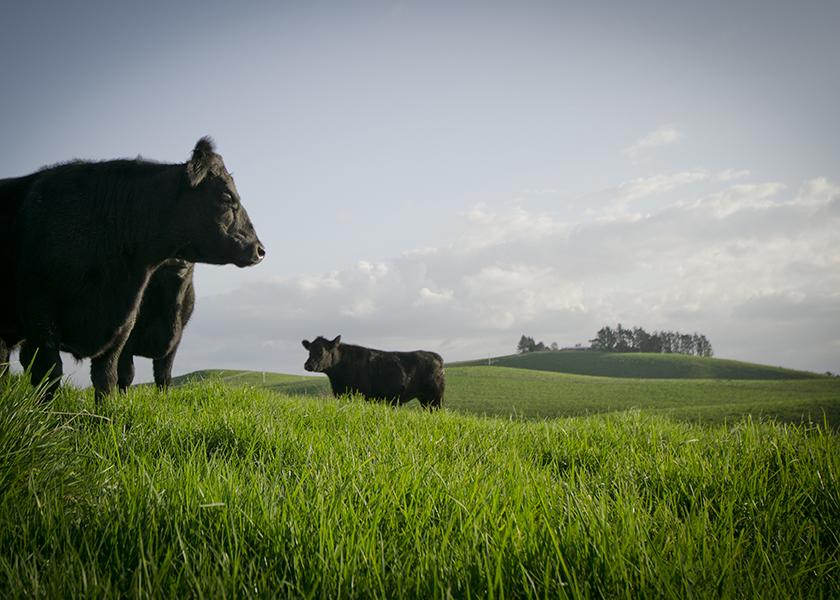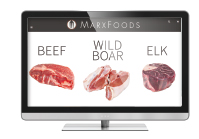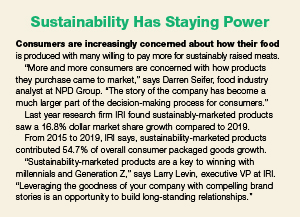Meat With A Story

A year into the coronavirus pandemic reveals much about the U.S. beef industry. Some of it bad, like how dependent producers are on packing plants running smoothly. But the near shutdown of foodservice during the early months of the pandemic did not create disaster for beef demand as feared. If anything, the pandemic’s disruption of foodservice confirmed Americans’ love beef — even when they’re forced to cook it at home.

In 2020, overall U.S. meat dollar sales increased 18.4% and volume sales grew 10.3% versus the same period in 2019, according to data analysis firm IRI. That translates into an additional $12.7 billion in meat department sales during the pandemic, including an astounding additional $5.7 billion for beef.
The fallout from shuttered restaurants, however, affected more than just owners and employees. Marx Foods, for instance, a fifth-generation family business, sold meat exclusively to restaurants prior to the pandemic.
“Our restaurant distribution just kind of evaporated overnight,” says CEO Justin Marx, who witnessed a 95% sales decline by the third week of March 2020. Nearly as fast as the pandemic-induced disruption, Marx Foods rebuilt its sales and distribution with online sales. That’s proven crucial not just to the company’s survival but to building a nationwide following for the unique Marx offering of proteins, which includes grass-fed beef, fish, elk, bison, kangaroo and even wild boar.
The Marx family traces their roots in the meat business to 1895 when their great-great grandfather immigrated from
Germany and opened a butcher shop in Brooklyn, N.Y. By the 1940s the business had expanded into a retail butcher shop and wholesale meat distribution. Frank Marx, Justin’s father, continued the family tradition and grew the company into a large meat processor and distributor by the 1970s. Today, Justin Marx, with brothers Keith and Garrett, operate offices in New Jersey and Seattle, Wash.
Multiple-generation success of Marx Foods can be attributed to hard work, sure, but also a willingness to adapt and change. The present generation, for instance, sells premium products, many sourced from American producers, but also from specialty meat programs in Canada, New Zealand, Australia and Europe. Marx also strives to satisfy growing consumer demands for sustainable meats.
“I can’t say that 100% of my products are sustainable,” Marx says, “but that’s where we’re trying to move our portfolio.”
And what is sustainable? Marx admits it’s kind of a variable term. “It means different things to different people. I think about sustainability for our suppliers and what they’re producing. I think first and foremost about greenhouse gas emissions. So, sustainability to me means either reduced or net zero greenhouse gas emissions.”
Marx says other aspects of sustainability for him include stewardship of the land and its resources.

“Sustainability must include consideration of future generations,” he says. “Maintaining the natural ecosystem on your farm or ranch that, at a minimum, keeps the land and the water resources as good as they were when you started. But I also recognize that profitability is an important component of sustainability. Ranchers can’t be sustainable if they are not profitable.”
As a supplier of high-quality and premium meats to consumers in all 50 states and many white tablecloth restaurants, recognizing and understanding how Marx Foods strives to serve its customers is important to U.S. cattle producers. His customer’s description of a top-notch steak, for instance, is likely different from yours.
“We sell higher-quality, premium-priced products that come with a story,” Marx says.
Price always matters and quality always matters, he says, but now the story matters, too. That’s one of the reasons Marx has chosen to import grass-fed beef from New Zealand’s Silver Fern Farms.

“It’s the most succinct story: beautiful animals on beautiful pastures raised by farmers who care a lot,” Marx says.
Last August, Marx collaborated with Silver Fern Farms and Beef and Lamb New Zealand, a farmer-owned cooperative, to launch a line of Angus beef sampler boxes for online purchase. The quality of which is similar to the philosophy Marx applies to meat and food products.
“Our guiding philosophy? A meal can never be better than its ingredients,” Marx says. “We know where each product comes from, whether we’re visiting the foragers that pick mushrooms throughout the Pacific Northwest or touring cattle ranches in New Zealand.”
Above all, Marx says he wants to be proud of the specialty meats his company provides to restaurants and online consumers. But what deserves the specialty meats title according to Marx?
“Specialty meats. That’s something to which I’ve given a lot of thought,” he says. “Specialty meats are ones that have a story you want to tell rather than a story you want to hide.”







